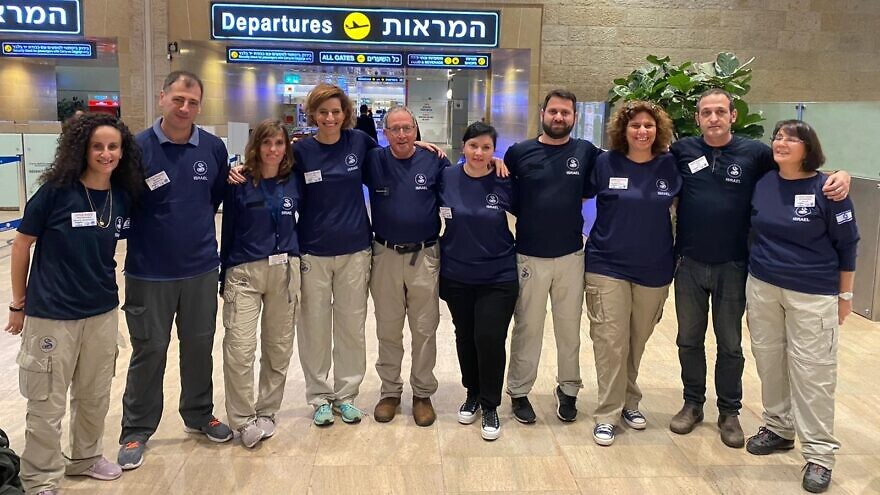A medical team from Israel is on its way to the Pacific island nation of Samoa to assist overwhelmed health-care workers trying to contain a serious measles epidemic and treat those already infected.
A reported 65 people—mostly children—are reported to have died in the outbreak, which has affected more than 4,400 citizens in the country of 200,000 since October. Unvaccinated children under age 4 are most at risk of deadly complications from the highly contagious virus.
Six nurses, two pediatricians and one physiotherapist—all with expertise in pediatrics and intensive care—left Israel on Saturday night. They should arrive in Samoa on Monday after a stopover in Hong Kong.
The team is led by Dr. Itai Pessach, director of the Edmond and Lily Safra Children’s Hospital at Sheba Medical Center, and nurse Assaf Luttinger, deputy director of the Israel Center for Disaster Medicine and Humanitarian Response based at Sheba.
In response, Israeli’s Foreign Ministry asked Bar-On to deploy a team within two hours. They didn’t have to bring supplies or medications, only their expertise.
“It is the capabilities of our personnel that they need, because the teams sent to Samoa from various regional, Pacific and international governmental and non-governmental organizations are getting burned out, working around the clock,” said Bar-On.
“They need heads and hands, and that’s what we sent.”
Sending help across the world
Since its founding in 2017 under Bar-On, the Israel Center for Disaster Medicine and Humanitarian Response has sent help to victims of a volcano in Guatemala, a cyclone in Mozambique and a cholera outbreak in Zambia.
The center also has provided pediatric cardiac specialists to Nigeria; orthopedists and general surgeons to Tanzania; ear, nose and throat specialists to Mongolia; and ophthalmologists to Papua New Guinea to provide cataract-removal surgeries.
The center is funded by donations. The cost of the current mission to Samoa is being footed by Sheba Medical Center, the largest hospital in the Middle East.
Bar-On says the team chosen for the Samoa mission is “highly experienced in intensive care and pediatric intensive care. Many of them also have extensive experience in disasters worldwide.”
Bar-On, a pediatric orthopedist and lieutenant colonel in the Medical Corps reserves of the Israel Defense Forces, was a member of several IDF humanitarian aid missions. He helped set up and staff field hospitals after natural disasters in Haiti, India, Nepal and the Philippines. He’s also worked with the International Red Cross and other humanitarian organizations.
“They need heads and hands, and that’s what we sent.”
Israeli relief teams usually receive coordination support from local Israeli diplomats. In this case, that assistance is coming from the office of Itzhak Gerberg, ambassador of Israel to New Zealand and non-resident ambassador to Cook Islands, Samoa and Tonga.
Bar-On expects that his team will report to him at least once a day after arriving in Samoa. They will help at Tupua Tamaese Meaole Hospital, where workers are having difficulty meeting the need for intensive care treatment, including ventilation, of measles patients.
Door-to-door vaccinations
In addition to the burden of caring for those already infected, the Samoan government shut down last Thursday and Friday to give full attention to educating people about the need to vaccinate.
They’ve been sending personnel door to door to give the measles vaccine or booster to those who hang a red flag or cloth outside to indicate unprotected family members. The shots are free for Samoans between 6 months and 60 years old.
“The Samoan health-care system has been simply overwhelmed.”
Prime Minister Tuilaepa Sailele Malielegaoi said he wants to bring vaccination coverage up from about 55 percent to 90 percent, at which point “herd immunity” kicks in and protects the few remaining unvaccinated.
Many Samoan parents decided against vaccinating their children against measles after an incident last year in which a vaccine was improperly mixed with a muscle relaxant and led to the deaths of two babies. Anti-vax groups then urged citizens to avoid the vaccine.
The vaccine itself is not in short supply.
“We will not need to deploy our field hospital or bring measles inoculations to Samoa. The Samoan health-care system has been simply overwhelmed by the sheer number of cases,” said Bar-On.
“Our team will be deployed to those locations where we can be of the most assistance and help save lives.”
This article was first published by Israel21c.

























